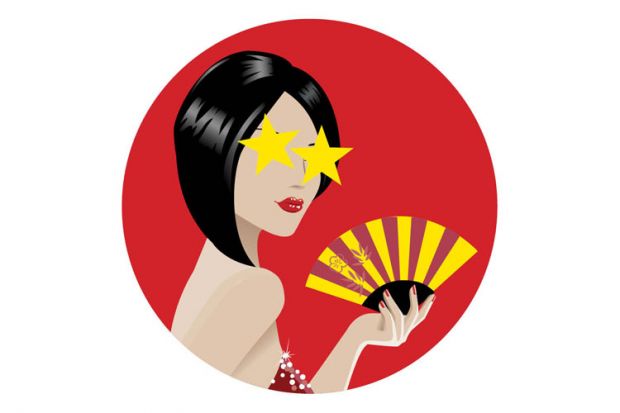What is the best way for a Chinese university to promote itself to prospective students?
One popular approach is to put beautiful girls and handsome boys on official websites and prospectuses to “draw the eyes”. This, however, has proved controversial.
In 2012, for a special promotional issue of its campus newspaper to be distributed to potential students, Tsinghua University (one of China’s two most prestigious institutions) featured on the cover pictures of five of its best-looking and most glamorous students under the tagline “I am waiting for you in Tsinghua”. Those five students included a woman well known for her beauty (her internet nickname is “milk tea girl”) and a man who had taken part in a national talent show. The Tsinghua admissions office distributed the issue across China to attract potential applicants.
The terms “university male idol” and “university female idol” were coined by netizens and quickly became catchwords in Chinese universities.
In 2013, the image of one graduating female student was exhibited prominently on the official website of Renmin University of China (also known as the People’s University). Visitors to the site were so impressed by the woman’s looks that they dubbed her “People’s University Female Idol”. The image drew thousands of online comments (just two examples: “a university with such beautiful girls is ideal for boys” and “Please marry me”). Within hours, traffic to the site skyrocketed.
The attention gained by such images has not gone unnoticed. Many public universities have followed suit and redesigned their homepages to show students who look like models.
Inspired by the phenomenon, a Wuhan University student established the “FaceJoking” website to elect the “Top 500 University Female Idols”.
But after Beijing Language and Culture University showcased its male and female idols, a comment by one alumnus was quickly spread on social media: “I hope my alma mater could provide each student with opportunities for a full and balanced development, based on independent academic research and free thinking, rather than every day seeing and talking about female or male idols.”
For universities, the phenomenon might represent an attempt to employ new techniques and media to communicate with prospective students. But in the Chinese press, there is a widespread concern it could be problematic. In one opinion piece, China Youth Daily argued that the university idols trend confirmed again that we live in a shallow “face culture society”. And on the website of the People’s Daily, the newspaper of the Chinese Communist Party, the writer Wang Chuantao asked a more serious question: isn’t it better for Chinese universities to associate themselves with thinkers such as Plato rather than female and male idols?
So how should universities market themselves?
The promotional video clip that most impressed the students in my class is not from a Chinese institution. It is a Harvard University video that shows a student turning on a worn-out tap in a dormitory. A caption says it is the same dormitory where former US president Franklin Roosevelt once lived.
I think my students have better taste than the Chinese universities pushing “idols”.
Register to continue
Why register?
- Registration is free and only takes a moment
- Once registered, you can read 3 articles a month
- Sign up for our newsletter
Subscribe
Or subscribe for unlimited access to:
- Unlimited access to news, views, insights & reviews
- Digital editions
- Digital access to THE’s university and college rankings analysis
Already registered or a current subscriber? Login

